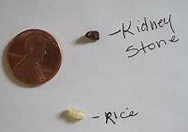
Kidney stones are one of the most common disorders of the urinary tract. Approximately one in ten people will develop a kidney stone in their lifetime; of these, half will experience a second episode within five years.
At Washington University, we offer a multidisciplinary approach to the management, treatment, and prevention of kidney stones.

The clinic brings together the expertise of two disciplines to provide a convenient, single point-of-care for patients. Patients can make one appointment and see both a urologist and nephrologist, if necessary. The clinic is co-directed by nephrologist Seth Goldberg, MD, Associate Professor of Medicine, and urologist Alana Desai, MD, Assistant Professor of Surgery.
The goal is to provide coordinated care to lower the risk of recurrence and to minimize the need for invasive operative procedures, with a focus on dietary and medical approaches.
Through imaging such as ultrasound, CT and X-ray, it will be decided what procedure, if any, a patient might need. The clinic has performed thousands of lithotripsy treatments, a non-invasive procedure that uses shock waves to break up the stones. Additional treatments include endoscopic stone removal and percutaneous (through the skin) stone removal; in complex cases, laparoscopic or robotic procedures are utilized. All are considered minimally invasive surgery.

A patient’s case will also be addressed through the laboratory – analyzing bloodwork, and, importantly, a 24-hour urine collection to see if there are any medical risk factors. Patients will be provided comprehensive educational material and counseled on diet and available medication therapies, when appropriate. The objective is to prevent new stones from forming or prevent the current stones that are there from getting bigger.
Furthermore, we are pioneering innovative strategies to maximize urinary dilution and, in conjunction with basic science researchers, are exploring genetic factors that may predispose the formation of calcium-based kidney stones.

Because of the importance of fluid intake in the prevention of kidney stones, the clinic is part of the Prevention of Urinary Stones with Hydration (PUSH) multicenter study currently underway. PUSH will test novel ways to help patients reach and maintain fluid intake goals to prevent kidney stones. The program will use financial incentives, health coaching and electronic reminders to determine the best way to encourage patients to drink more water.
PUSH participants will receive a “smart” water bottle that syncs with an app on their mobile device. The app will track water intake and remind the patient to drink water throughout the day. To find out more about the study, please contact Juanita Taylor at (314) 454-7047 or email study coordinators at PUSH@wustl.edu. Watch a video explaining the PUSH study.
For more information on the Multidisciplinary Kidney Stone Clinic, contact Nurse Coordinator, Joann Reagan at (314) 362-7581. Patients can be seen at either of our two locations, on the 11th floor of the Center for Advanced Medicine and the Barnes-Jewish West County Clinic.